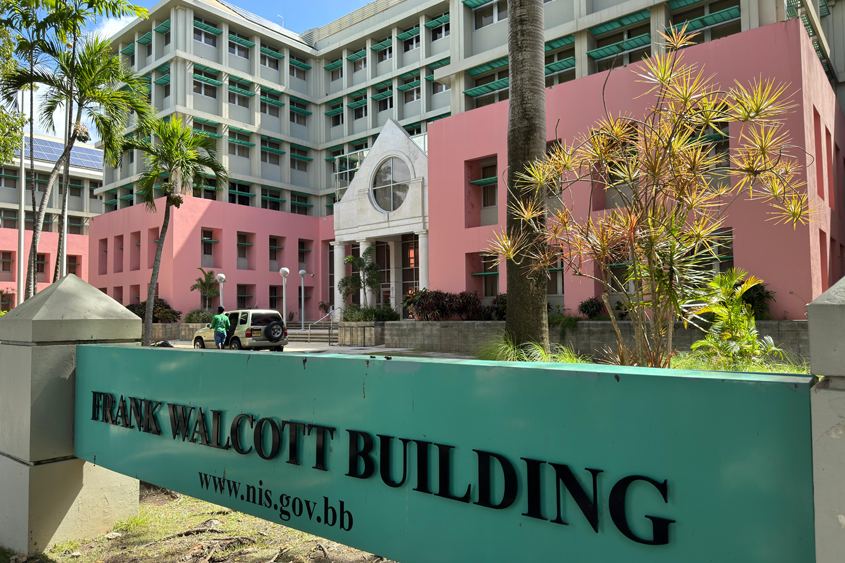

The International Monetary Fund’s (IMF) staff has tabled a number of fiscal policy suggestions, including property and value added tax (VAT) policy changes, it thinks Government could consider in the quest for more financial wriggle room.
While concluding that corporate tax reforms implemented nearly a year ago could provide a financial windfall, the IMF team says that “a range of additional fiscal policy measures could be considered to create additional fiscal space for investment, or as contingencies in the event of downside risks”.
“Potential measures include broadening the tax base, including through revamping the value added tax (VAT) regime for the tourism sector, reforming the property tax regime, and/or further streamlining current expenditures and prioritising capital expenditure,” the IMF staff advises in their latest report which was submitted to the Fund’s executive board on December 18.
“Maintaining strong fiscal surpluses and rebuilding fiscal space, while increasing the efficiency of public spending and the scale of social and infrastructure investment, will help to lay the foundations for stronger, more resilient growth.”
The staff report was completed on December 3 after the IMF Barbados mission team, led by Michael Perks, ended a visit to the island on November 6. During that trip, the delegation met with officials including Prime Minister and Finance Minister Mia Amor Mottley, Central Bank of Barbados Governor Dr. Kevin Greenidge, and Minister in the Ministry of Finance Ryan Straughn.
Talks were also held with other senior government officials, trade unions, banks, the private sector, and development partners.
The IMF report examines Government’s fiscal performance, noting that “the primary surplus is expected to reach 3.8 per cent of revised GDP for fiscal year 2024/25, in line with the third review”.
“Overall revenues are projected to be considerably higher than at the third review. While the over-performance from the shift in timing of property tax and corporate income tax (CIT) payments is expected to unwind in the second half of the fiscal year, unanticipated one-off revenue gains associated with the 2023 CIT reform and adoption of International Financial Reporting Standard 17 are expected to persist, increasing fiscal year 2024/25 revenues by about $100 million (0.3 per cent of GDP),” the staff team said.
“The additional revenues will provide space for additional programmed capital spending on critical infrastructure projects, including repairs to the capital stock damaged by Hurricane Beryl and infrastructure improvements to boost resilience to future natural disasters.
“Meanwhile, current expenditure is envisaged to be broadly in line with the budget, with the fiscal costs of policy measures to cushion the impact of Hurricane Beryl expected to be absorbed by budget reallocation,” officials added.
In terms of the next few years, the report said that “the medium-term fiscal path envisages further increases in the primary surplus to maintain debt sustainability and secure stronger, more resilient growth”.
“The primary balance is expected to rise in fiscal year 2025/26 to a steady state of 4.3 per cent of revised GDP, in line with the third review and consistent with achieving the 60 per cent debt target by fiscal year 2035/36. Capital spending is expected to decline slightly in fiscal year 2025/26, before rising to a steady-state of around 3.4 per cent of GDP over the medium term,” it states.
“Importantly, the capital spending envelope remains sufficient to accommodate expected expenditures on the South Coast Water Reclamation Project and other critical capital or social spending.”
The IMF report also said that “the fiscal effort in fiscal year 2025/26 will continue to be driven by further savings from state-owned enterprise (SOE) reforms and tight current expenditure management, in line with the third review”.
“On the revenue front, baseline projections remain conservative, assuming the unwinding of one-off revenues from fiscal year 2024/25. Any additional windfalls from the CIT reform could be used either for critical social and capital spending, given large investment needs, or to further rebuild fiscal space if capital spending constraints persist,” it added.
The IMF team also commented on efforts to strengthen revenue collection through reforms, including boosting tax compliance and reducing tax waivers and exemptions.
On the first matter, the report noted that the Barbados Revenue Authority (BRA) and Barbados Customs and Excise Department (BCED) “have completed the work to ensure the mandatory use of the tax identification number (TIN) as the unique identifier of importers and exporters and as a requirement to conduct any border transaction.
“Effective implementation of the TIN and improved data sharing between BRA and BCED will be essential to enhance tax compliance. Looking ahead, ensuring an adequate quality and quantity of human resources at the BCED is critical, especially given the high vacancy rate and further challenges caused by expected retirements in the coming years,” IMF representatives said.
They advised that an initial study to assess the current workload and staffing of the BCED was completed in May, with the support of the Barbados-based IMF agency the Caribbean Regional Technical Assistance Centre CARTAC support.
“Building on this study, the authorities are advancing work on assessing human resource needs at the BCED to address capacity and operational needs, identify obstacles to filling critical vacancies, and establish a roadmap to fill such vacancies,” the report said, noting that this is a structural benchmark scheduled for completion by the end of March.
On tax waivers and exemptions, the IMF staff observed that “sizable revenues are foregone due to tax waivers and exemptions – around six per cent of GDP in fiscal year 2023/24)”.
“The authorities have already implemented a formal and time-bound transition process requiring all pre-existing tax and customs waivers to requalify under the modernised duty and tax exemptions framework,” they acknowledged.
“The previously announced Exemptions Enforcement Monitoring Unit has now been established in the Ministry of Finance, Economic Affairs and Investment to audit existing tax concessions and verify the compliance of beneficiaries with tax, labour, and other laws required for maintaining benefits.”
With the process for recertification of concessions due to begin in 2025, the report said that starting this month the IMF through technical assistance “will review the coverage of tax expenditure reporting and provide more granular policy recommendations, including on further rationalising the tax exemptions regime”.
Completing the reforms of SOEs were also mentioned as key to improving Government’s fiscal performance.
The staff report said the authorities “are continuing to make progress on SOE reforms to reduce the impact on the budget and improve both efficiency and service delivery”.
“The government demonstrated a commitment to streamlining expenditures and reforming SOEs, most notably through the divestment of the Barbados Agriculture Management Company. This reform is expected to reduce budget transfers by about 0.3 per cent of GDP over the medium term, though a transitional fiscal cost is expected in fiscal year 2024/25,” the staff representatives said.
“Additional efficiency gains are envisaged through the amalgamation of the Urban Development Commission and Rural Development Commission and the restructuring of the National Housing Corporation, plans for which have been approved by Cabinet.
“During the first half of fiscal year 2024/25, Technical Memorandum of Understanding SOE transfers were below last year’s levels, consistent with the programme quantitative performance criterion.”
The National Insurance and Social Security Service (NISSS) was flagged as an example of a successfully reformed SOE.
“Recent reforms have improved the independence, oversight, and sustainability of the national pension system. The transition of the NISSS to an independent statutory corporation in late-2023 has increased its autonomy from the central government budget and improved its operational flexibility,” the report highlighted.
“Additionally, to increase transparency and oversight, the NISSS has submitted all its financial statements up to 2023 for audit by the Auditor General, who has now commenced a fact-finding assessment.”
It added: “In recent years, NISSS’ financial position has stabilised, reflecting the economic recovery from the COVID-19 pandemic, which reduced benefit spending pressures and boosted collections. At the same time, the recent amendments to the public pension law to raise the retirement age and increase contributions will reduce the pressures from population decline and ageing on the NISSS financial position.”





